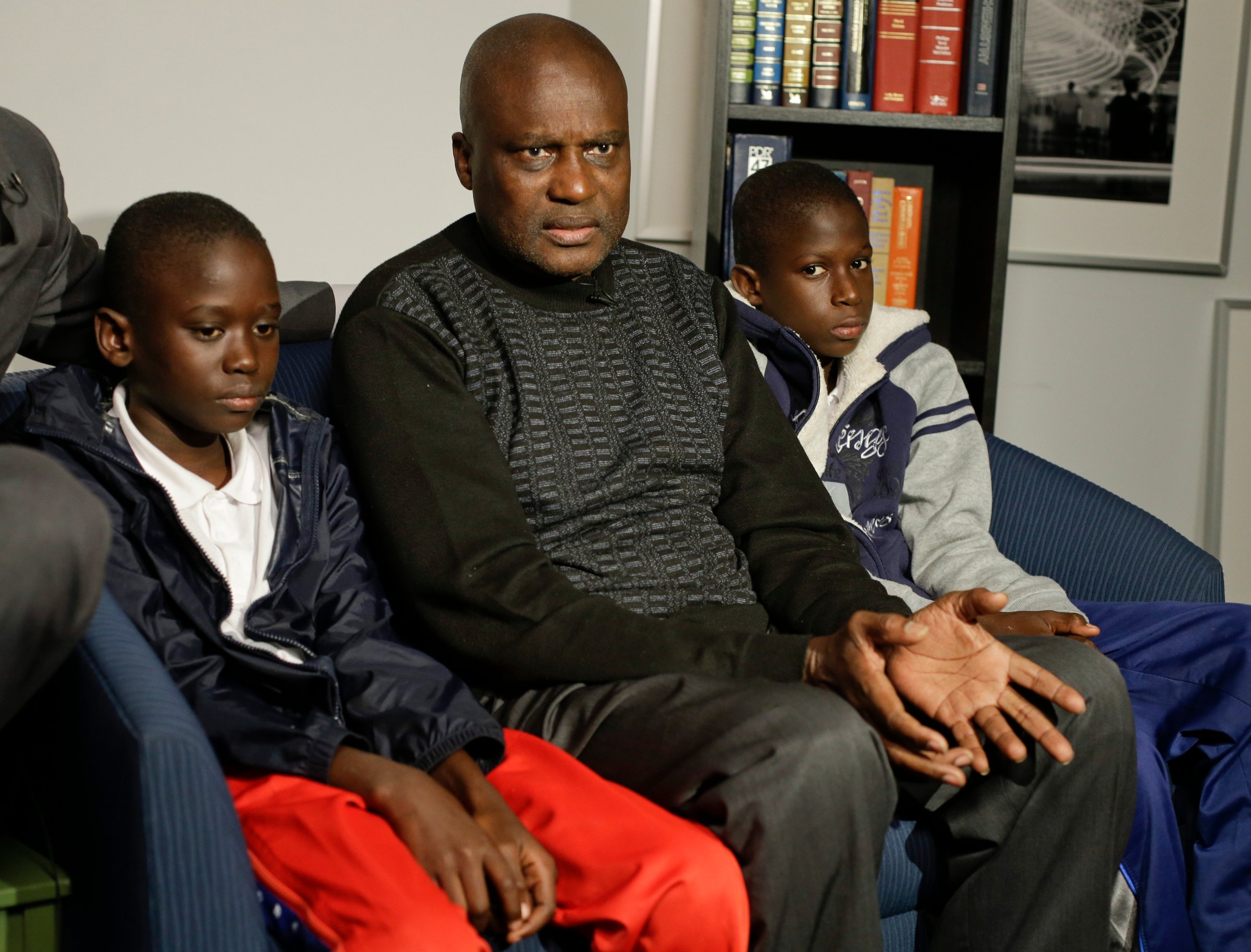
The father says the bullying began soon after his two sons arrived at their New York City school from Senegal almost one month ago. They were called “Ebola” by other students, taunted about possibly being contagious and excluded from playing ball. Ousmane Drame says the baiting finally erupted into a physical fight on Oct. 24 when 11-year-old Amadou and his 13-year-old brother Pape were pummeled by classmates on the playground of Intermediate School 318 in the Bronx.
“It’s not just them,” Drame said at a press conference. “All the African children suffer this.”
The brothers’ experience is an extreme example of the backlash felt by some Africans in the U.S. since the Ebola virus arrived from West Africa. Many others tell of facing subtler, but no less hurtful, forms of discrimination at work, in school and as they commute as fear of the little-known but often deadly disease has spread among the public.
In Staten Island, the largest Liberian community outside of Africa, one woman says she was forced to take temporary, unpaid leave from her job because of her nationality. Liberians in Minnesota have been told to leave work after sneezing or coughing. In New Jersey, two elementary school students from Rwanda were kept out of school after other parents pressured school officials. At Navarro College, a public community college in Texas, officials mailed letters rejecting international applicants from African countries, even ones from countries without confirmed Ebola cases. (The school has since apologized for sending out “incorrect information.”)
“This is a larger problem,” says Charles Cooper, president of the New York City–based African Advisory Council, an advocacy group. “People are on the train and they sneeze and hear, ‘I hope you don’t have Ebola. I hope you don’t give me Ebola.’ Xenophobia is growing around this, but many people are afraid to come out publicly.”
The spread of previously unknown, contagious diseases in the U.S. has often led to these sorts of overreactions. For Ebola, those fears appear driven by the circumstances of the virus — its high mortality rate, its gruesome symptoms, its origins on a continent often misunderstood by Americans — even though the odds of contracting it in the U.S. remain exceedingly low. A recent poll from the Harvard School of Public Health found that more than half of adults worry there will be a large Ebola outbreak inside in the U.S. over the next year, while over a third are worried that they or a family member will be infected.
While fears erupted around people diagnosed with polio in the 1940s and SARS in the 2000s, public-health experts point to the start of the AIDS epidemic in the early 1980s as the last time Americans attached a similar stigma to people even loosely associated with the virus. At the time, many Americans refused to be near those suspected of having HIV, unaware of how it was actually transmitted.
“A lot of what I’m seeing today was present at the very beginning of the AIDS epidemic,” says Robert Fullilove, a Columbia University professor of sociomedical sciences, who has been researching HIV since the mid-1980s. “It’s this tendency to separate between two different groups, when somebody’s ‘otherness’ is associated with a deadly disease. It’s like déjà vu all over again.”
That toxic brew of fear and misinformation led to discrimination against gays — the disease was unfairly yet colloquially known as the “gay plague” for its disproportionate toll among homosexual men — and people from Haiti, which was the first country in the western hemisphere with confirmed cases of HIV.
“Haiti itself became stigmatized,” says Dr. Joia Mukherjee, a Harvard Medical School associate professor. “The same thing is happening now with Liberians, and indeed all of Africa.”
In both cases, the driving forces are the same: a general lack of understanding about the disease, how it is transmitted and where it’s been concentrated.
“The average American doesn’t even recognize how big Africa is,” Fullilove says of the Ebola stereotypes.
The bullying allegedly faced by the Drame brothers is a case in point. The vast majority of Ebola cases are in Liberia and Sierra Leone. Senegal had only one confirmed case and is now considered free of the disease by the Centers for Disease Control and Prevention (CDC).
Countering such misinformation has been central to the messaging strategy of the CDC and government officials. It’s no coincidence that President Obama hugged Nina Pham after the Dallas nurse was declared free of the virus. And the image offensive may be paying off. According to a new ABC News/Washington Post poll, the people least worried about catching the disease or a larger U.S. outbreak were the ones who knew the most about how Ebola is transmitted.
Read next: 2 Kids from Senegal Were Beaten Up in NYC by Classmates Yelling ‘Ebola’
More Must-Reads from TIME
- Cybersecurity Experts Are Sounding the Alarm on DOGE
- Meet the 2025 Women of the Year
- The Harsh Truth About Disability Inclusion
- Why Do More Young Adults Have Cancer?
- Colman Domingo Leads With Radical Love
- How to Get Better at Doing Things Alone
- Michelle Zauner Stares Down the Darkness
Contact us at letters@time.com